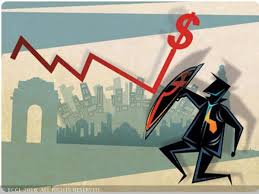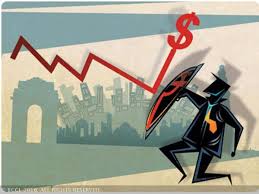
The stomping down of the currencies of emerging markets by the dollar is not going to end soon, say analysts.
Ever since Donald Trump clinched a surprise victory in the U.S. presidential election, the greenback has been on a tear. Demand for the dollar has been boosted by expectations of inflation and which has also pushed up bond yields up and is based on hopes of an aggressive fiscal stimulus plan under the Trump administration.
"This is a dollar environment," Mitul Kotecha, head of Asia foreign-exchange and rates strategy at Barclays, told the media. "It's difficult to argue against the dollar when you're going to see U.S. growth outperform as well, probably ultimately towards the end of next year," he said.
There would be several percent more rise in the near term in the value of the dollar index, which measures the greenback against a basket of currencies, Kotecha anticipates.
According to data made available by Reuters, there was an at least five year high jump on Friday in the value of the dollar index which reached a value of as high as 101.32 in Asia trade on Friday. This rise was from a low of 97 that were seen in the days leading up to Trump's win.
He said that the emerging market currencies are already hard hit and the dollar's strength is also set to continue to weigh on those currencies further.
"We'll see further depreciation of emerging markets currencies, especially those that are really I guess susceptible to bond outflows. Those currencies are going to be hit by potential trade sanctions form the U.S.," Kotecha said. A punitive approach to U.S. trade partners including China and Mexico was promised by the rhetoric of Trump's campaign.
"We don't know to what magnitude, to what extent what Trump will actually do. But the EM positive environment seems to be being dashed at the moment," Kotecha said.
However expectations that the U.S. economy was set for a smooth ride under Trump management has not entirely been agreed upon by every one – that is for sure.
"We are not fully sold on the rising expectation of a goldilocks phase ahead for the U.S.", Taimur Baig, chief Asia economist at Deutsche Bank, said in a note this week.
However there were fairly wide spread and agreed upon expectations about the assumption that the dollar would strengthen further.
A Nomura survey found that expectations that the dollar index will climb another 5 percent over the next two months as noted by 182 of its clients in the survey that was conducted earlier in the week. the Nomura note, dated Thursday, also said that the clients also expected the 10-year U.S. Treasury yield would approach 3 percent by next year.
Trump's plans to goose the economy through fiscal stimulus would increase the budget deficit and fan inflation was the bet that U.S. Treasurys sold off on. Bond prices move inversely to yields.
Up from levels below 1.8 percent in the days before the election, on Friday, the yield on the benchmark 10-year note rose as high as 2.3380 percent.
Noting the first increase since 20006, that was the yield's highest level since early December of 2015, before the U.S. Federal Reserve hiked interest rates on December 16.
(Source:www.cnbc.com)
Ever since Donald Trump clinched a surprise victory in the U.S. presidential election, the greenback has been on a tear. Demand for the dollar has been boosted by expectations of inflation and which has also pushed up bond yields up and is based on hopes of an aggressive fiscal stimulus plan under the Trump administration.
"This is a dollar environment," Mitul Kotecha, head of Asia foreign-exchange and rates strategy at Barclays, told the media. "It's difficult to argue against the dollar when you're going to see U.S. growth outperform as well, probably ultimately towards the end of next year," he said.
There would be several percent more rise in the near term in the value of the dollar index, which measures the greenback against a basket of currencies, Kotecha anticipates.
According to data made available by Reuters, there was an at least five year high jump on Friday in the value of the dollar index which reached a value of as high as 101.32 in Asia trade on Friday. This rise was from a low of 97 that were seen in the days leading up to Trump's win.
He said that the emerging market currencies are already hard hit and the dollar's strength is also set to continue to weigh on those currencies further.
"We'll see further depreciation of emerging markets currencies, especially those that are really I guess susceptible to bond outflows. Those currencies are going to be hit by potential trade sanctions form the U.S.," Kotecha said. A punitive approach to U.S. trade partners including China and Mexico was promised by the rhetoric of Trump's campaign.
"We don't know to what magnitude, to what extent what Trump will actually do. But the EM positive environment seems to be being dashed at the moment," Kotecha said.
However expectations that the U.S. economy was set for a smooth ride under Trump management has not entirely been agreed upon by every one – that is for sure.
"We are not fully sold on the rising expectation of a goldilocks phase ahead for the U.S.", Taimur Baig, chief Asia economist at Deutsche Bank, said in a note this week.
However there were fairly wide spread and agreed upon expectations about the assumption that the dollar would strengthen further.
A Nomura survey found that expectations that the dollar index will climb another 5 percent over the next two months as noted by 182 of its clients in the survey that was conducted earlier in the week. the Nomura note, dated Thursday, also said that the clients also expected the 10-year U.S. Treasury yield would approach 3 percent by next year.
Trump's plans to goose the economy through fiscal stimulus would increase the budget deficit and fan inflation was the bet that U.S. Treasurys sold off on. Bond prices move inversely to yields.
Up from levels below 1.8 percent in the days before the election, on Friday, the yield on the benchmark 10-year note rose as high as 2.3380 percent.
Noting the first increase since 20006, that was the yield's highest level since early December of 2015, before the U.S. Federal Reserve hiked interest rates on December 16.
(Source:www.cnbc.com)





